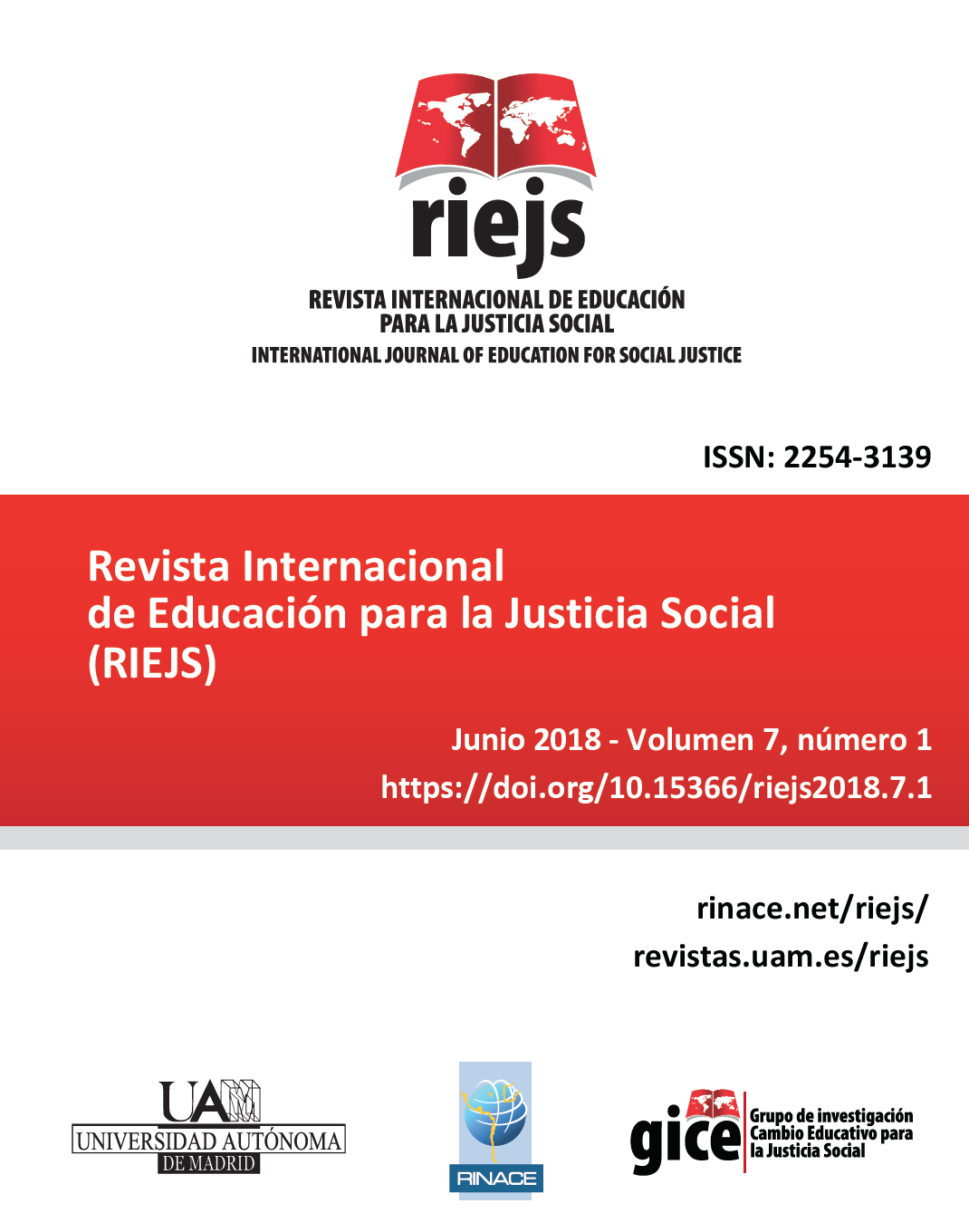La Democracia en Educación y los Movimientos de Renovación Pedagógica: Evaluación de Prácticas Educativas Democráticas
Palabras clave:
Democracia, Educación, Escuela, Indicadores educativos, Docente.Resumen
Una de las funciones principales de las escuelas consiste en preparar al alumnado para aprender a vivir y convivir como futuros ciudadanos activos y críticos en el marco social. En este proceso, ha sido muy relevante la existencia de movimientos que han servido y sirven de referencia al conjunto de ciudadanos de la sociedad. En España, los Movimientos de Renovación Pedagógica (mrp) han defendido la educación democrática como uno de los pilares esenciales de las escuelas. En este artículo analizamos el grado de democratización de experiencias educativas promovidas por estos colectivos: Red Khelidôn, Granollers en Transición / Casal del Mestres y MeSumaría. Se ha realizado una exhaustiva revisión del estado de la cuestión referente a la educación democrática, la cual ha servido para elaborar un sistema de 16 indicadores que, tras ser validado por expertos, se ha utilizado para comprobar el cumplimiento de las bases de la educación democrática en las experiencias seleccionadas. Se concluye que se está avanzando hacia lo que entenderíamos como práctica democrática, las tres experiencias educativas pueden ser democráticas, ello denota que el modelo de los mrp es posible, y nos permite transmitir a la sociedad la importancia que tienen las actuaciones y las iniciativas que estos desarrollan para alcanzar una mejora real en la educación.
Descargas
Citas
Apple, M. W. y Beane, J. A. (1997). Escuelas democráticas. Madrid: Morata.
Belavi, G. y Murillo, F. J. (2016). Educación, democracia y justicia social. Revista Internacional de Educación para la Justicia Social, 5(1), 13-34. https://doi.org/10.15366/riejs2016.5.1
Biesta, G. (2016). Democracia, ciudadanía y educación: De la socialización a la subjetivación. Foro de Educación, 14(20), 21-34. https://doi.org/10.14516/fde.2016.014.020.003
Biesta, G. y Lawy, R. (2006). From teaching citizenship to learning democracy: Overcoming individualism in research, policy and practice. Cambridge Journal of Education, 36(1), 63-79. https://doi.org/10.1080/03057640500490981
Bolívar, A. (2016). Educar democráticamente para una ciudadanía activa. Revista Internacional de Educación para la Justicia Social, 5(1), 69-87. https://doi.org/10.15366/riejs2016.5.1
Carr, P. R., Pluim, G. y Thésée, G. (2017). The dimensions of, and connections between, multicultural social justice education and education for democracy: What are the roles and perspectives of future educators? Citizenship Education Research Journal, 6(1), 3-23.
Checkoway, B. (2013). Education for democracy by young people in community-based organizations. Youth & Society, 45(3), 389-403. https://doi.org/10.1177/0044118X11419535
Domínguez, J. (s.f.). La escuela democrática. Recuperado de https://goo.gl/lZ1fqe
Domínguez, J. (2006). Un currículo democrático. Democratizar los currículos. Recuperado de https://goo.gl/fd3oGO
Domínguez, J. (2008). Centros democráticos. Los centros educativos democráticos como ecosistemas necesarios para los currículos democráticos. Recuperado de https://goo.gl/rofGW9
Edelstein, W. (2011). Education for democracy: reasons and strategies. European Journal of Education, 46(1), 127-137. https://doi.org/10.1111/j.1465-3435.2010.01463.x
Feito, R. (2009). Escuelas democráticas. Revista de la Asociación de Sociología de la Educación, 2(1), 17-33.
Feito, R. y López, J. I. (2008). Construyendo escuelas democráticas. Barcelona: Hipatia.
Guba, E. G. (1983). Criterios de credibilidad en la investigación naturalista. En J. Gimeno y A. Pérez (Coords.), La enseñanza: Su teoría y su práctica (pp. 148-165). Madrid: Akal.
Hansen, D. T. y James, C. (2016). The importance of cultivating democratic habits in schools: Enduring lessons from democracy and education. Journal of Curriculum Studies, 48(1), 94-112. https://doi.org/10.1080/00220272.2015.1051120
Llamas, E. y Gorbe, P. (2014). Pensamiento crítico: Una propuesta educativa para educación primaria. En J. J. Maquilón, A. Escarbajal y R. Nortes (Eds.), Vivencias innovadoras en las aulas de primaria (pp. 557-570). Murcia: Universidad de Murcia.
Martínez, J. (1993). Los MRPs o el compromiso en la escuela. Cuadernos de Pedagogía, 220, 104-109.
Martínez, J. (2002). ¿Qué son los MRP? Cuadernos de Pedagogía, 311, 85-89.
Mejía, J. (2000). El muestreo en la investigación cualitativa. Investigaciones Sociales, 4(5), 165-180.
Navarro, R. (1989). El franquismo, la escuela y el maestro (1936-1975). Historia de la educación: Revista Interuniversitaria, 8, 167-180.
Parareda, A., Serra, C. y Tort, A. (2015). La democracia y la participación en los centros escolares. Aula de Innovación Educativa, 243, 12-16.
Pericacho, F. J. (2014). Pasado y presente de la renovación pedagógica en España (de finales del siglo XIX a nuestros días). Un recorrido a través de escuelas emblemáticas. Revista Complutense de Educación, 25(1), 47-67.
Pericacho, F. J. (2015). Actualidad de la renovación pedagógica en la Comunidad de Madrid: Un estudio a través de escuelas emblemáticas. Evolución y experiencias actuales ante los retos socioeducativos de la sociedad del siglo XXI. Tesis doctoral. Universidad Complutense, Madrid.
Piñuel, J. L. (2002). Epistemología, metodología y técnicas del análisis de contenido. Estudios de Sociolingüística, 3(1), 1-42.
Puig, J. M. (2000). ¿Cómo hacer escuelas democráticas? Educaçao e Pesquisa, 26(2), 55-69. https://doi.org/10.1590/S1517-97022000000200005
Rogero, J. (2010). Movimientos de renovación pedagógica y profesionalización docente. Revista Latinoamericana de Educación Inclusiva, 4(1), 141-166.
Serbia, J. M. (2007). Diseño, muestreo y análisis en la investigación cualitativa. Hologramática-Facultad de Ciencias Sociales, 3(7), 123-146.
Torrego, L. M. (1999). Canción de autor y educación popular (1960-1980). Madrid: Ediciones de la Torre.
Torrego, L. (2013). Defendiendo lo colectivo: Combatir el conformismo, promover la educación pública. Revista Interuniversitaria de Formación del Profesorado, 78(27,3), 115-123.
Torrego, L. (2014). ¿Investigación difusa o emancipatoria? Participación e inclusión en investigación educativa. Magis: Revista Internacional de Investigación en Educación, 7(14), 113-124. https://doi.org/10.11144/Javeriana.M7-14.IDEP
Yus, R. (2002). Educación integral y educación democrática. Barbecho. Revista de Reflexión Socioeducativa, 1, 12-15.

